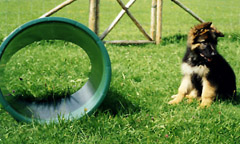Educate dogs pain-free and non-violently
 Animal psychologists attach great importance to a painless, non-violent dog education that is characterized by good togetherness and voluntariness. Who wants a dog who is scared of fear and does not follow commands joyfully? Who wants a dog who likes torture only until he can bite? Nobody wants to have such a dog. If you buy a dog, you usually want a friend and partner on four paws. This requires mutual consideration and harmonious, friendly interaction.
Animal psychologists attach great importance to a painless, non-violent dog education that is characterized by good togetherness and voluntariness. Who wants a dog who is scared of fear and does not follow commands joyfully? Who wants a dog who likes torture only until he can bite? Nobody wants to have such a dog. If you buy a dog, you usually want a friend and partner on four paws. This requires mutual consideration and harmonious, friendly interaction.
Do you work for nothing? Do not forget the reward!
With friendliness, clear announcements and correct handling one gets further than with force. If communication, rules and reward are good, then it usually works well with learning and performance. The reward is the fee for the work done. Understandable, because honestly: Do you work for nothing? The dog fee does not always have to be a treat for the sake of the slim line. It can also be a game, a caress or a praise.
Dogs need guidance
It is important that the dog gets some guidance, if he has something has done right or wrong. This is quite simple: wrong is ignored and rehearsed until it is true and the praise can be done. The right thing will of course be immediately praised and rewarded. You see, if the dog makes a mistake, you do not have to punish him severely or scold loudly. They ignore the mistake and give the command again, so that the four-legged friend has the chance to do it right this time. The incentive is the reward the dog will go for. But sometimes that's the way it is: every now and then it takes a while until the knot bursts.
Keep away from painful atrocities!
Conclusion: Stay away from horrors such as choking, spiked or electrocollar! Better fill the reward bag and work confidently and in a friendly manner with your dog.
Study proves: Electric shocks bother dogs
A pilot study of Lincoln University in the UK shows that training with electro-collars leads to behavioral changes, which may be due to pain or disgust. Despite low setting and warning function, the dogs were stressed and the stress was only after training. The lead author of the PLOSone study, Prof. Jonathan Cooper, found that electric shocks did not achieve better results than experienced, non-violent traning. According to Cooper, the risk to the well-being of the dog is due to both the wrong and the recommended use of the electric collars. By the way: In Germany, the use of electrical equipment is prohibited, but not the promotion of it and not the sale of such devices. Text/Photo: Marion Friedl